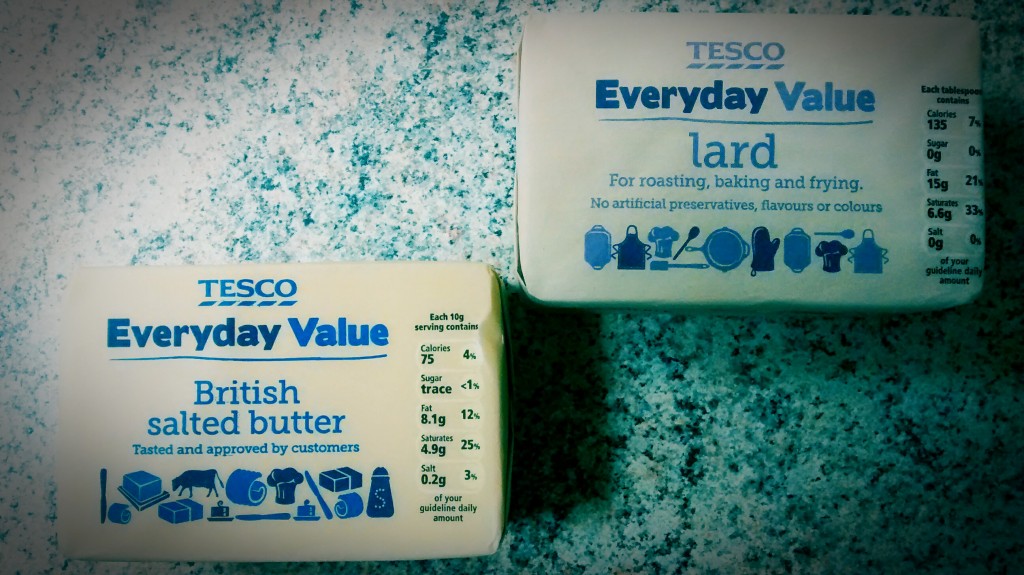
Virgin coconut oil is not detrimental to blood lipid levels. However, refined coconut oil may have negative effects because it is deodorised and chemically altered. Lard is not a saturated fat as it contains more unsaturated fatty acids than saturated fatty acids. Butter contains short chain fatty acids which are not associated with blood lipid changes.
Saturated fat is considered hypercholesterolaemic by many individuals. However, this opinion is not warranted based on scientific evidence. Many studies investigating the effects of saturated fat on cholesterol levels have used coconut oil and compared it with polyunsaturated fatty acids. Regression analysis is then used to relate levels of myristic (C14), lauric (C16) and palmitic (C18) acid to plasma cholesterol levels. However, saturated fatty acids of less than 10 carbon atoms, and more than 18 carbon atoms are said to be neutral from a plasma cholesterol point of view. This calls into question the use of blanket terms such as ‘saturated fatty acids’ in reference to the plasma lipid effects of dietary fats. Further, the use of saturated coconut oil is problematic because other dietary saturated fats do not consistently raise plasma levels of cholesterol. This may related to the refined nature of most commercially available coconut oils which are used in research. Unrefined virgin coconut oil may not have the same detrimental effects on plasma cholesterol levels.
For example, in one study1, researchers compared the effects of refined coconut oil, beef fat and safflower oil on the plasma lipid levels in healthy volunteers. Isocaloric substitution of fats occurred in a crossover designed study which allocated five weeks to each treatments following a normal food ad libitum baseline diet. This baseline diet produced no significant differences between the subjects in terms of their plasma lipid levels. Following the five week study periods, ingestion of coconut oil was reported to increase in total cholesterol, high density lipoprotein (HDL) cholesterol and low density lipoprotein (LDL) cholesterol compared to safflower oil, but cause a reduction in triglycerides. In contrast, ingestion of beef fat caused significant increases in triglycerides, but reductions total cholesterol and HDL cholesterol compared to coconut oil. Only increases in total cholesterol were reported when beef fat was compared to safflower oil. However, for all fats, the relative ranking of the lipid measurements remained unchanged for all fats tested.
However, it cannot be said that any of these treatments would have caused an increase in the risk of cardiovascular disease, because there are a number of problems with the methodology. Firstly, the use of safflower oil as the polyunsaturated fatty acid should be questioned. Safflower oil contains gamma linolenic acid, a precursor to the series 2 eicosanoids, which have significant metabolic effects that could favourable modify plasma lipoprotein levels. The use of this oil does not therefore allow a fair comparison between unsaturated fatty acids and saturated fatty acids as the former contains hormone modifying agents that could bias the result. In addition, the lower plasma triglycerides following consumption of the coconut oil compared to the beef fat and safflower oil can be explained by the higher concentration of medium chain triglycerides (C8 and C10) in coconut oil. These fatty acids are more water soluble and ar absorbed through the portal system to the liver, preventing normal chylomicron formation.
That many studies examining the effects of coconut oil have not distinguished between refined coconut oil and virgin coconut oil is also interesting. Refined coconut oil is deodorised, beached and further processed to produce a tasteless odourless chemically altered oil that does not resemble the original composition of the coconut. In particular, refined coconut oil does not contain the same levels of antioxidants present in virgin coconut oil. Concluding that coconut oil can detrimentally alter blood lipid changes while using a refined product is therefore disingenuous. Further, when virgin coconut oil is used in studies investigating the effects of coconut oil on blood lipid changes, beneficial changes are seen. For example, in one study, filtered virgin coconut oil was fed to dyslipidaemic women for a 12 week period and caused a reduction in LDL, and increase in HDL and an improved LDL to HDL ratio, when compared to controls and soybean oil2. Rat experiments also show the beneficial effects of unrefined virgin coconut oil on plasma lipids3.
RdB
